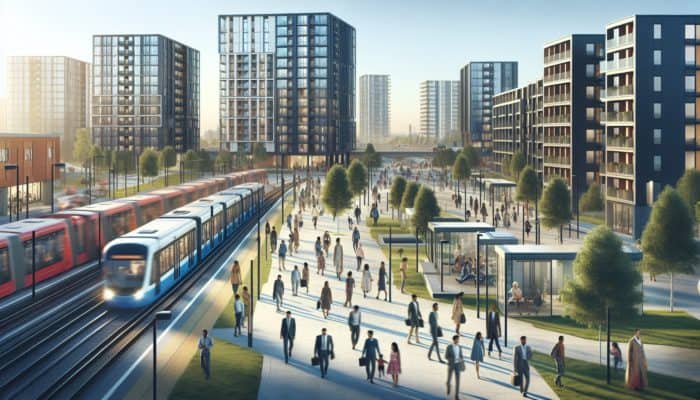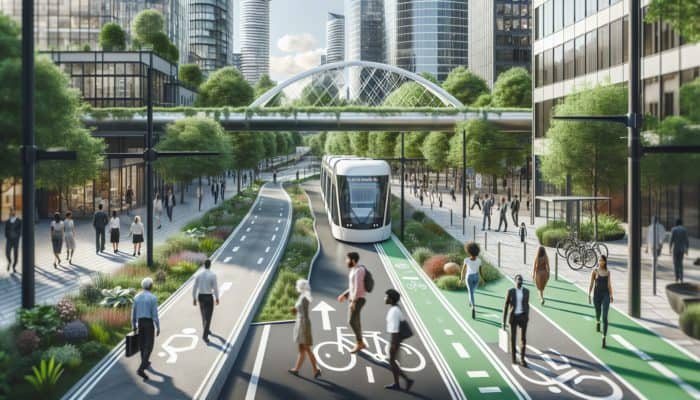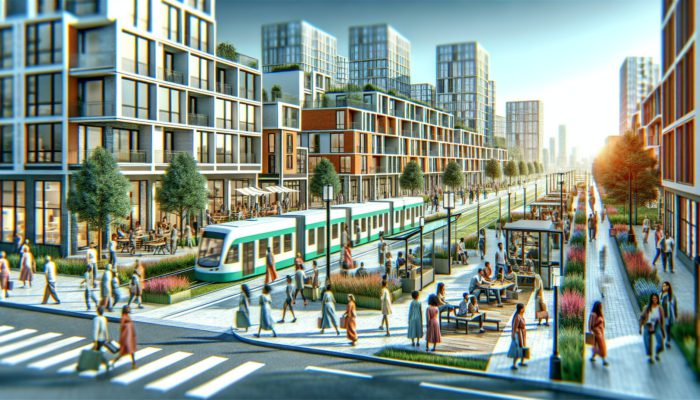
Top Entry-Level Homes Near Public Transport in Brits
Insights into the Dynamic Real Estate Market of Brits
Exploring Current Trends in the Property Market

Top Entry-Level Homes Near Public Transport in Brits: The real estate market in Brits is currently experiencing a significant boom, largely driven by a marked increase in demand for affordable housing located near reliable public transport. This rising interest has sparked several key trends that are reshaping the market landscape. Some pivotal trends contributing to this surge in growth include:
- Growing demand for affordable housing: An increasing number of individuals are seeking cost-effective living options, leading to a substantial rise in interest in entry-level properties.
- Urban development initiatives: Continuous investments in infrastructure and urban planning are enhancing the attractiveness of Brits for potential homebuyers.
- Escalating rental prices: As the cost of renting continues to rise, more people are exploring homeownership, which is stimulating the entry-level market.
- Improvements in accessibility: Enhanced access to public transport routes has made areas that were previously less desirable much more appealing to buyers.
- Changing demographic patterns: An influx of young professionals and families seeking starter homes is significantly altering the dynamics of demand.
These trends reflect a vibrant market where properties conveniently located near public transportation are increasingly in demand. This surge indicates not only a thriving market but also a shift in how individuals prioritise their living arrangements.
Exploring Diverse Entry-Level Property Options
In Britain, aspiring homeowners have the opportunity to explore a range of entry-level properties tailored to meet various needs and budgets. The most common types of properties available include:
- Flats and apartments: Perfect for individuals or young couples, these options provide compact living spaces equipped with essential amenities.
- Townhouses: Typically featuring multiple bedrooms, these properties strike a balance between space and affordability, making them popular choices.
- Duplexes: A preferred option for families, duplexes offer increased living space and a sense of independence.
- Small freestanding houses: While slightly more expensive, these homes offer the quintessential experience of family living.
- Retirement units: With an ageing population, these properties are specifically designed to cater to older buyers seeking comfortable and accessible living solutions.
Each property type caters to different buyer profiles, enhancing the overall diversity within the market and allowing for a more tailored approach to homebuying.
Understanding the Significance of Location in Property Value
The location of a property plays a pivotal role, especially for entry-level buyers. Being situated near public transport can dramatically affect not only the value of a property but also its overall appeal. Several factors contribute to an ideal location, including:
- Proximity to transport nodes: Properties located near bus stops and train stations are more desirable due to their increased accessibility.
- Access to local amenities: Areas that boast nearby schools, shops, and recreational facilities enhance the overall living experience.
- Safety and community quality: A low crime rate and active community engagement can significantly elevate the attractiveness of a location.
- Potential for future development: Areas earmarked for growth or major infrastructure projects may witness an increase in property values.
Location transcends mere convenience; it is a strategic decision that can result in considerable financial benefits over time, making it a critical consideration for prospective buyers.
Exploring the Advantages of Living Near Public Transport

Realising Cost Savings on Commuting Expenses
Living in proximity to public transport offers substantial cost savings on commuting expenses. Residents can significantly reduce their expenditures on fuel, parking fees, and the maintenance costs associated with car ownership. On average, households situated near transport links can save between R5,000 and R15,000 annually, depending on their commuting patterns. This financial relief can significantly enhance a family’s budget, enabling increased discretionary spending or savings for future investments. Furthermore, utilising public transport reduces dependency on personal vehicles, fostering a more sustainable lifestyle that contributes to a lower environmental footprint.
The financial benefits extend beyond immediate savings. As more individuals opt for public transport, the demand for properties in proximity to these services continues to rise, often resulting in increased property values. This creates a beneficial cycle where residing near transport not only leads to cost savings but also enhances the long-term value of the property investment.
Understanding the Increase in Property Value
Properties that are strategically located near public transport tend to appreciate at a faster rate compared to those situated further away. Several key factors contribute to this appreciation, including:
- Accessibility: The convenience of easy access to transport options attracts more buyers, subsequently driving up demand and property prices.
- Convenience: Homes that offer hassle-free commuting options are particularly appealing to young professionals and families.
- Urban development: As areas near transport hubs experience infrastructure enhancements, property values typically rise in tandem.
- Market trends: Economic shifts favouring urban living further support the value of locations close to public transport.
Investing in properties near public transport is not just a lifestyle choice; it’s a wise financial strategy that can yield significant returns over time.
Enhancing Lifestyle Through Convenience

The convenience of residing near public transport greatly enhances the lifestyle of residents by streamlining daily routines. With easy access to transport options, residents can significantly reduce their commute times, allowing for more leisure time and less stress. This convenience promotes a healthier work-life balance, enabling individuals to participate in social activities and community events without the burden of lengthy travel times.
Moreover, living close to transport networks often places residents in vibrant neighbourhoods rich in restaurants, shops, and cultural experiences. This proximity encourages a more dynamic lifestyle, fostering community engagement and social interactions. For families, having schools and parks nearby further adds to the appeal, making day-to-day life more enjoyable and enhancing overall quality of life.
How Can You Locate the Best Entry-Level Homes in Brits?
Leveraging Real Estate Websites Effectively
The advent of the digital age has transformed the way potential buyers search for properties. Numerous real estate websites offer comprehensive listings of entry-level homes in Brits, streamlining the process of finding suitable options. Notable websites to consider include:
- Property24: A premier site in South Africa, it boasts an extensive range of listings, complete with detailed property descriptions and neighbourhood insights.
- Realtor.co.za: This platform is rich in resources for first-time buyers, offering market analysis and detailed neighbourhood guides.
- Private Property: A user-friendly site that allows for tailored searches based on budget, location, and property type.
- Gumtree: While primarily known for classifieds, it features a variety of property listings, often at competitive prices.
These websites empower buyers by providing in-depth information, enabling them to make informed decisions regarding their potential investments. Thorough searches can reveal hidden gems that may be overlooked through traditional channels.
Collaborating with Local Real Estate Agents
Working with local real estate agents can significantly enhance the experience for buyers navigating the British property market. These professionals possess invaluable insider knowledge about the area and can offer insights that online listings may not fully convey. Buyers can harness this expertise by inquiring about local trends, future developments, and historical pricing data.
Local agents can also identify properties that might not yet be listed online, providing buyers with a competitive advantage in a fast-moving market. Establishing a good rapport with an agent can lead to personalised service, tailored property recommendations, and guidance through the complex buying process, ensuring that buyers secure the best deals while avoiding potential pitfalls.
Maximising Opportunities by Attending Open Houses
Open houses offer an invaluable opportunity for buyers to view properties in person, allowing them to assess the condition and layout of a home before making a decision. During these visits, buyers should focus on several crucial inspection points, including:
- Condition of the property: Look for signs of wear and tear, such as peeling paint, creaky floors, or damp patches.
- Layout and space: Consider how the space flows and whether it meets your practical needs.
- Natural light: Observe the level of natural light in the property, as this can significantly enhance the living experience.
- Surrounding area: Take note of the neighbourhood, local amenities, and proximity to public transport.
These factors can greatly influence the decision-making process. Attending open houses equips buyers with firsthand insights that online photos may not fully capture, empowering them to make informed choices.
Expert Insights on the Best Entry-Level Homes Near Public Transport in Brits
Market Analysis from Local Experts
Local experts provide invaluable market analysis that helps buyers understand the intricacies of the British property landscape. For instance, successful property investments have been observed in areas surrounding the Brits railway station, where properties typically attract premium prices due to their accessibility and the community’s growth.
One illustrative case study highlights a family that purchased a townhouse near the station three years ago for R800,000. With the area’s ongoing development and increasing interest in public transport, the property is now valued at R1.2 million, demonstrating the potential for impressive returns. Such real-world examples underscore the importance of understanding market dynamics and making informed decisions based on expert insights.
Strategies for Effective Price Negotiation
Negotiating the price of an entry-level home is a crucial step, particularly in a competitive market. Buyers should approach negotiations strategically by conducting thorough research on comparable properties and their prices. This data provides essential leverage during discussions and helps establish reasonable expectations for both parties.
Moreover, buyers should be prepared to make a strong offer if they find a property they love, especially if it’s situated in a desirable location. Initiating with a fair offer based on market value demonstrates seriousness and respect for the seller’s position. Additionally, being flexible with closing dates and other terms can strengthen the negotiation process, resulting in a mutually beneficial outcome for both the buyer and seller.
Anticipating Future Market Trends
Gaining an understanding of future market trends can significantly influence buyers’ decisions when searching for entry-level homes near public transport. Experts predict continued growth in Brits, primarily driven by urbanisation and infrastructure development. The recent expansion of bus routes and the introduction of new transport facilities are anticipated to drive demand further.
As more South Africans prioritise public transport for convenience and sustainability, properties located near these networks are likely to attract increased interest. Buyers should focus on areas identified for future growth, as these locations can offer substantial returns on investment in the years to come.
Exploring Financing Options for First-Time Buyers
Navigating the various financing options is crucial for first-time buyers interested in entry-level homes located near public transport in Brits. Numerous mortgage products cater specifically to this demographic, often featuring lower deposit requirements and attractive interest rates. Buyers should explore options such as government-backed loans specifically designed for first-time homeowners, which can simplify the path to ownership.
Additionally, collaborating with financial advisors can help buyers understand their borrowing capacity and identify the best mortgage products suited to their financial situation. Gaining insight into the intricacies of financing can significantly impact buyers’ ability to secure their ideal homes without overextending their budgets.
Location-Specific Amenities and Lifestyle Enhancements
Living near public transport in Brits often comes with an abundance of location-specific amenities that enrich the lifestyle of residents. Areas featuring top entry-level homes typically provide easy access to schools, shopping centres, and recreational facilities. For example, the vicinity of Brits’ primary transport hubs provides residents with access to a variety of local shops and dining options, fostering a vibrant community atmosphere.
Moreover, parks and recreational spaces are generally within walking distance, promoting outdoor activities and family engagement. The convenience of having these amenities nearby not only enriches daily living but also fosters a sense of community and belonging among residents, making it an appealing aspect of living in Brits.
What Are the Essential Characteristics of Entry-Level Homes in Brits?
Size and Layout Considerations
Entry-level homes in Brits generally offer compact living spaces that cater to a variety of lifestyles. Common layouts include one- and two-bedroom apartments, which are particularly attractive to young professionals and small families. The average size of these homes ranges from 50 to 80 square metres, providing just enough space for essential living without unnecessary excess.
These properties often feature open-plan designs that maximise space and enhance the flow of natural light. This design approach is especially beneficial in smaller homes, as it creates an illusion of spaciousness while maintaining functionality. Buyers should carefully consider how these layouts align with their lifestyle and future needs, ensuring that the selected home provides both comfort and practicality.
Desirable Amenities and Facilities
Many entry-level homes in Brits come equipped with essential amenities that appeal to first-time buyers. Some sought-after features often include:
- Secure parking options: Valued in urban environments, off-street or secure parking facilities add significant convenience.
- Access to communal spaces: Many complexes feature gardens or recreational areas, fostering a sense of community among residents.
- Modern appliances: Updated kitchens and bathrooms enhance livability and reduce immediate renovation costs for new homeowners.
- Energy-efficient features: Properties equipped with energy-saving technologies help lower utility bills, making them more appealing to budget-conscious buyers.
These amenities play a critical role in a buyer’s decision-making process, significantly enhancing the attractiveness of entry-level homes in this region.
Understanding Affordability and Financing Options
Affordability is a paramount consideration for entry-level buyers in Britain. The local market offers a range of prices; however, buyers need to understand how financing options can affect their purchasing power. Many first-time buyers may face challenges in finding a mortgage that aligns with their budget, while also considering additional costs such as property taxes, insurance, and ongoing maintenance.
Investigating various financing options, including fixed-rate mortgages or government assistance programmes, can help buyers navigate these challenges more effectively. Additionally, maintaining a strong credit score and saving for a larger deposit can lead to more favourable mortgage rates, making homeownership more attainable. Understanding the financial landscape is crucial for securing an entry-level home without jeopardising long-term financial stability.
How Does Public Transport Affect Property Prices in Britain?
Influence of Proximity to Bus and Train Stations
Properties situated near bus and train stations in Brits frequently command higher prices due to their desirable locations. On average, homes located within 1 km of public transport hubs can be valued between R100,000 and R200,000 more than similar properties situated further away. This price differential reflects the growing demand for convenience, as buyers increasingly prioritise access to transport when making purchasing decisions.
Additionally, areas that have historically been overlooked are now experiencing a resurgence in interest due to enhanced transport links. This trend is reshaping the market as more buyers recognise the value of living near public transport options.
Impact of Transport Infrastructure on Property Values
Recent advancements in transport infrastructure have profoundly influenced property values in Britain. The introduction of new bus routes and expansions to existing train services have made some areas significantly more accessible. Consequently, regions that once had limited appeal are now transforming into hotspots for prospective homebuyers.
For example, the neighbourhood surrounding the newly implemented bus rapid transit system has witnessed a rise in property values as residents appreciate reduced commuting times. Such infrastructural improvements not only enhance the desirability of the area but also contribute to long-term property appreciation, making it a wise investment for potential buyers.
Long-Term Appreciation in Property Value
Investing in properties near public transport in Brits often results in long-term appreciation of value. Historical data indicates that properties located within a 10-minute walk of public transport have appreciated by approximately 10-15% over recent years. This trend is expected to persist as urbanisation and population growth continue to drive demand for accessible housing.
Buyers should be aware that investing in these areas holds the potential for significant returns. As more individuals seek the convenience of public transport, properties in such locations are projected to maintain their attractiveness, making them sound investments for those looking to secure their financial futures.
Proven Strategies for Finding Top Entry-Level Homes Near Public Transport in Brits
Identifying Undervalued Properties for Investment
Locating undervalued properties can lead to lucrative investment opportunities within the British market. Buyers should adopt a proactive approach by researching neighbourhoods poised for development yet to be fully recognised by the market. Identifying potential growth areas involves looking for signs of upcoming infrastructure projects, zoning changes, or revitalisation efforts within the community.
Buyers should also consider properties that may require cosmetic updates but are in excellent structural condition. Such homes often present opportunities for value addition through minor renovations, allowing buyers to secure a property at a lower price point while simultaneously increasing its value. By adopting a discerning eye for potential, savvy buyers can uncover hidden gems in the market.
Timing the Market for Optimal Purchasing Opportunities
Timing the market effectively can significantly enhance a buyer’s prospects in securing the best deals on entry-level homes in Brits. The property market often exhibits seasonal trends, with a higher volume of listings available during specific times of the year. Typically, spring and early summer see a surge in listings, creating competition among buyers. In contrast, the quieter months of winter may present opportunities for lower prices, as sellers are often more motivated to close deals.
Buyers should stay informed about market trends and collaborate with local agents to determine the best time to enter the market. Understanding these patterns enables buyers to time their purchases strategically, potentially leading to more advantageous deal terms and favourable purchase prices.
Maximising Returns Through Renovation and Upgrades
Renovating entry-level homes can yield significant returns, particularly in desirable locations near public transportation. Buyers can enhance a property’s value by implementing strategic upgrades, such as modernising kitchens and bathrooms, improving energy efficiency, or enhancing outdoor spaces.
For instance, a homeowner who renovated their small flat by upgrading the kitchen and adding a balcony discovered that these improvements increased the property’s value by 20% within five years. Such renovations not only enhance the living experience but also position the property favourably in the market for future sales. Buyers should consider the potential for value enhancement when evaluating properties, making renovations an integral part of their investment strategy.
What Challenges Do Buyers Face When Purchasing Entry-Level Homes in Brits?
Facing Competition from Other Buyers
The high demand for entry-level homes in Brits means that buyers may encounter stiff competition from others seeking similar properties. In a competitive market, bidding wars can drive prices higher, making it challenging for first-time buyers to secure their desired homes. To differentiate themselves, buyers should come prepared with pre-approved financing and be ready to make competitive offers.
Moreover, establishing a strong emotional connection with the seller can influence the outcome of negotiations. Buyers should consider crafting personalised letters expressing their intentions and motivations for purchasing the home. This personal touch can sometimes sway a seller’s decision, particularly if they have an emotional attachment to the property.
Dealing with a Limited Inventory of Homes
Finding available entry-level homes can be challenging in a tight market, where inventory frequently falls short of demand. Buyers should adopt a proactive approach by consistently checking listings, collaborating with local agents, and broadening their search parameters. Expanding the search radius may reveal properties that meet their criteria but are situated slightly further from key transport links.
Networking within the community can also yield leads on upcoming listings or properties that may not yet be publicly available. Buyers should remain adaptable in their expectations, as flexibility can often lead to unexpected opportunities in a competitive landscape.
Navigating the Complexities of the Buying Process
The process of purchasing a home can be intricate, particularly for first-time buyers. Common pitfalls include failing to secure pre-approved financing, neglecting to conduct thorough inspections, or overlooking crucial contractual details. To navigate these challenges, buyers should educate themselves about the homebuying process and work closely with real estate agents, financial advisors, and legal professionals.
Buyers must conduct thorough due diligence to ensure they understand all aspects of the transaction. Engaging in open communication with their agent and asking pertinent questions will help clarify uncertainties. This level of preparedness can empower buyers to make informed decisions, ensuring a smoother homebuying experience.
Highlighting Success Stories of Entry-Level Home Buyers in Brits
Inspirational Experiences of First-Time Buyers
First-time buyers in Britain frequently share inspiring success stories that illuminate the potential of navigating the property market—many recount overcoming initial fears and uncertainties by engaging with knowledgeable agents and utilising community resources. One couple, for instance, successfully purchased a two-bedroom townhouse despite a tight budget by leveraging local financing options and negotiating effectively with the seller.
These stories resonate with others in similar situations, highlighting the importance of perseverance and informed decision-making. First-time buyers often create a supportive network, sharing valuable insights and tips that can significantly impact their journey toward homeownership.
Remarkable Investment Returns from Property Purchases
Some buyers have experienced extraordinary returns on their investments, particularly those who acquired properties near transport links. For example, a family that purchased their home for R1 million three years ago reported a current market value of R1.5 million due to the heightened demand for homes in their area.
Such returns have provided these buyers with financial freedom, enabling them to invest in additional properties or enhance their quality of life. The positive experiences of these homeowners demonstrate the potential for entry-level properties to provide a solid foundation for long-term financial success.
Community Enrichment Through New Homeowners
Purchasing a home can have a profound impact on the community, as new residents bring fresh perspectives and energy. Many first-time buyers in Britain actively participate in local initiatives, from attending community events to supporting local businesses. Their presence often contributes to revitalising neighbourhoods and fostering a sense of belonging.
For instance, one new resident initiated a community garden project that not only beautified the area but also brought neighbours together. Such contributions underscore how new homeowners can have a profoundly positive impact on their communities, fostering a more vibrant and inclusive environment.
Strategies for Overcoming Challenges in Home Buying
Navigating obstacles such as financing difficulties and market competition is a common theme among entry-level buyers in Britain. These individuals have often shared effective strategies for overcoming these challenges, such as forming strong relationships with local agents and utilising financial resources specifically aimed at first-time buyers.
Additionally, many have emphasised the importance of perseverance in their search, employing creative financing solutions and remaining open to properties that may require renovations. These stories underscore the resilience of buyers who are determined to achieve their homeownership dreams, even when faced with hurdles along the way.
Frequently Asked Questions About Entry-Level Homes in Brits
What are the characteristics of entry-level properties in Brits?
Entry-level properties in Brits typically refer to affordable homes suitable for first-time buyers, encompassing options such as apartments, townhouses, and small houses.
Why is location critical when purchasing a home?
Location is vital as it significantly impacts property value, accessibility to essential amenities, and the overall quality of life for residents.
How does living near public transport reduce costs?
Residing near public transportation lowers commuting expenses, including fuel and parking fees, resulting in considerable annual savings for residents.
What financing options are available for first-time buyers?
First-time buyers can access a variety of financing options, including government-backed loans, fixed-rate mortgages, and programmes specifically designed for new homeowners.
What is the average price increase for homes in proximity to public transport?
Homes located near public transport typically appreciate at a rate of 10-15% over time, reflecting the growing demand and desirability of such locations.
How can you identify undervalued properties in Brits?
Buyers can discover undervalued properties by researching emerging neighbourhoods, seeking homes needing minor renovations, and monitoring upcoming developments.
What common challenges do first-time buyers encounter?
First-time buyers often face challenges such as high competition, limited inventory, and navigating the complexities of the buying process.
How significant is it to collaborate with a local real estate agent?
Local real estate agents provide invaluable insights, help identify opportunities, and guide buyers through the purchasing process, making them essential allies in the journey to homeownership.
What renovations can enhance the value of my home?
Renovations that modernise kitchens and bathrooms, improve energy efficiency, and enhance outdoor spaces can significantly boost a property’s value.
How can I effectively negotiate the price of a home?
Effective negotiation involves researching comparable properties, making fair offers, and being flexible with terms to create mutually beneficial situations for both buyers and sellers.













